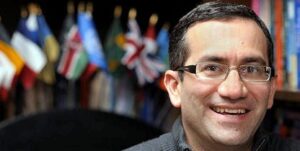
In the wake of two Gulf wars costing thousands of American lives and billions in U.S. treasure, Iraq is now rapidly being reshaped into a terrorist state. Transylvania University Political Science professor Michael Cairo, author of The Gulf: The Bush Presidencies and the Middle East (Studies in Conflict, Diplomacy and Peace), replied via email to a series of questions concerning the current escalation of sectarian violence in Iraq as Sunni insurgents seek to create a new ultra fundamentalist Islamic State of Iraq and Syria (ISIS).
Tom Martin: There may be confusion about the forces now in play in Iraq: Shiite versus Sunni and in particular, the full scale of the intentions of the Sunni insurgency and what its success would imply.
Michael Cairo: What most people fail to realize is that Iraq, in its present state, is a post-World War I creation of the mandate system.
Under the Ottoman Empire, the areas within Iraq were far from the center and relatively autonomous. As long as these regions remained stable and did not upset the Empire’s interests, the Ottomans stayed out of the region.
Following World War I, the British brought three relatively autonomous groups together under one state: the Kurds in the north, the Shiite in the south, and the Sunni triangle in the center of the country. It is also important to realize that the Shiite have a majority in the country. Despite the Kurds also being Sunni, they share different interests than the Sunni in the center of the country.
Throughout Iraq’s existence, violence, paternalism, corruption, and patronage have been central to politics. Saddam Hussein’s rule added to the distrust since he used violence against the Kurdish and Shiite populations and promoted the power and position of the Sunni population within the triangle.
The overthrow of Saddam Hussein contributed to distrust and violence. The Bush administration’s de-Baathification of the country meant the removal of all those associated with Hussein’s regime, including those involved simply for employment. This created a ready-made “angry” Sunni population. The Shiite government of Nouri al-Maliki has also contributed to this by ensuring benefits for the Shiite population at the expense of the Sunni.
The current sectarian violence, thus, is not a surprise to anyone familiar with the region and its history.
TM: What US interests are at stake in the present crisis?
MC: First, there is a bit of irony here since it may serve to create additional channels of cooperation for the US and Iran.
In recent years, the Shiite Government of Iraq and the Iranian Government have developed closer relations. Moreover, the Shiite cleric Ayatollah Ali al-Sistani has called for fighting against the insurgents in the north, suggesting a possible collaborative effort between the Iraqi Shiites, the Iraqi Government, and the Iranian Government with possible assistance from the US (most likely air strikes). Iranian President Hassan Rouhani said his country is ready to help Iraq if asked, and would consider working with the United States in fighting Sunni extremists if the US decides to take action.
At the same time, this could prove problematic for the US since it might potentially increase Iranian power in the region. Not showing a degree of interest could signal to Iran that the US is willing to let Iran extend its power in the region. The U.S. aircraft carrier deployed in the Gulf has, in my opinion, two purposes – one to send a signal to Iran and two to be prepared if the president chooses an air strike option.
Second, the US most certainly has economic interests in the region. Gas prices have spiked as ISIS has had an impact on oil fields in northern Iraq, shutting down exports from that region. The heart of Iraq’s oil region is located in the south and an ISIS advance could seriously threaten oil exports and US economic interests in the region.
Third, ISIS could have a significant impact on Israel, Jordan, Turkey, and Lebanon, putting potentially threatening and violent regimes near their borders. Spill-over from the crisis could have a significant affect on the region and lead to a wider war, which could prove disastrous.
TM: How does the present event differ from previous episodes of civil upheaval in Iraq and the region? The Iranian angle might be one example, but anything else?
MC: The current situation could be seen as a continuation of the past, as well as retribution for the past. Sectarian conflict has been a part of Iraqi history. Saddam Hussein’s atrocities against the Kurds and Shiites are well known. The Shiites have dominated the system since 2003 and have used economic and political patronage, and violence, as a form of retribution and control. The difference today is that there is an increasingly religious element to the conflict. Saddam Hussein’s regime was secular. ISIS is an Islamist group, changing the nature of the conflict somewhat. Iraq is also home to one of the holiest sites for the Shiites, Karbala. This adds to the threat that ISIS presents.
TM: Is there a credible possibility that what is now Iraq might end up fragmented, giving rise to the imagined ISIS?
MC: Absolutely. This is certainly a possibility given the fact that Iraq as a state is an artificial creation, drawn on a map with a pencil and a ruler by British diplomats. This, however, would not necessarily mean a reduction in violence since these entities would likely have conflicting interests. In addition, control of the economic resources – oil – could become even more significant for these new entities.
TM: Why should Americans care about what is happening in Iraq?
MC: First, Iraq’s geographic position in the Middle East – surrounded by Saudi Arabia, Kuwait, Iran, Jordan, Syria, and Turkey – means that it has implications for the countries that surround it. What happens in Iraq can have significant ramifications for what happens elsewhere in the Middle East.
Second, Iraq has significant implications for the international economy with its vast oil reserves. We have already seen oil prices go above $113 as a result, in part, of the conflict. In addition, the conflict constrains companies from investing in those oil fields. It is also important to remember that we are partially responsible for the current crisis in Iraq. We opened the floodgates with the overthrow of Saddam Hussein.
TM: There have been observations made in media in recent days to the effect that if Bush over-reached in Iraq, Obama has under-reached. Wherever blame for any U.S. failures may rest, it doesn’t change the fact that with the rise of ISIS we have lost thousands of lives, damaged thousands more and evidently wasted billions in treasure in an attempt to stabilize Iraq.
MC: It is generally correct. It is a tragic case of conflict. While Bush certainly overreached, I am not so sure that Obama under reached. Frankly, I am not convinced that increased US force in Iraq can stabilize the region without a serious long-term commitment. The American public is not prepared for a permanent American presence in Iraq and such a presence might only serve to increase reactions from forces like ISIS.
It is important to remember that American domestic politics matters too. Obama could not have “overreached” even if he wanted to. The critics often forget what he was handed. While I certainly admit he’s made mistakes along the way, we need to be careful not to forget that he entered office facing an American public that was tired of war and ready to get out. Perhaps he over responded to the American public, but our recent experiences in Iraq were impacting both him and the public. The idea of fighting a long term war was out of the question for most Americans.




